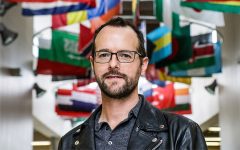Professor Justin Paulson: Putting your Knowledge to Practise

Don’t expect an easy master’s program when you walk through the doors of the Institute of Political Economy. It’s rigorous academic research requiring a high level of intellectual involvement. But once you walk out, you’ll be among the best. Sociology professor Justin Paulson can vouch for that.
He explains that political economy is a field of intellectual inquiry that has been around for a long time, eventually broken down into the official school subjects we know well today: history, political science, sociology and economics. Carleton’s unique unit stays true to the tradition, bringing in various disciplines under a common roof.
Students who are welcomed into the program, usually about 12-15 of them each year, produce such high quality research Paulson puts it on par with the highest degree of achievement, the doctorate. Upon entrance to the program, the bonds between students are almost immediate. It’s a story best explained as a blend of hard work and camaraderie. In their first year, students receive instruction on how to complete their thesis or research essay. Once they hit second year, they focus on getting it done.
The common thread in all the projects Paulson has overseen is original research. Theory joins on-the-ground work, allowing students to both study and experience first-hand what they’ll write about. Although he will prod students in the M.A. program to continue their studies to the doctoral level, they’re often snatched up by government agencies and NGOs, and decide to go that route instead.
Paulson’s own research focuses on social theories and histories of transitions in economics. Trumpism, for example, is the topic of the hour.
In the past, Paulson has taught the M.A. core theory course. He’s been rewarded for his teaching: he was nominated for a Capital Educator’s Award and in 2013 he won the Faculty of Arts and Social Sciences Teaching Award. Professor Paulson currently teaches the core course (PECO 6000) for the Institute’s Collaborative PhD with a Specialization in Political Economy.